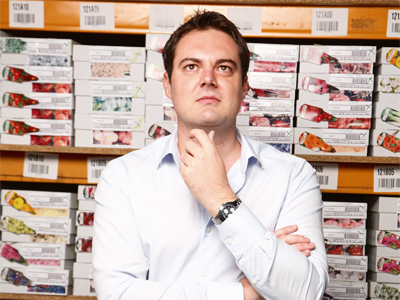James Buffoni, Ryedale Group
For the right printing company, there are big opportunities in exporting their expertise and their products. What has been the experience of those who are currently doing so?
Ryedale Group of Yorkshire is in the third year of export activity on the European mainland, finding a niche printing plastic tags for the horticulture industry in France and more recently The Netherlands. It has been a slow process to achieve growth, with a good deal of competitive pressure, an unfavourably strong pound, and a learning process in regards to local policies and legislation.
James Buffoni, commercial director, emphasises that the company always viewed this as a long term assignment though: ‘We are producing in sterling and selling in euros and that takes a big chunk from the margin. But we went into this for the long term and there will be peaks and troughs.’
In France, Ryedale set up a company with native sales, design and administration staff to speak to the French market, while production took place in the UK. In The Netherlands it has been more of a partnership with an existing company. Discovering that French banks would not provide overdraft facilities until a company had been trading for a specified number of years was one of the shocks. Instead, funding had to come from private equity.
Then there is the competition: ‘We were trying to approach the market discreetly but as soon as competitors found out they lowered their prices immediately,’ said Mr Buffoni. ‘That has slowed the growth. We are trying to out-perform them in other areas than price. We feel we have a fantastic product and creative services around it and that is just starting to take hold now.’
Ryedale Group was indebted to some degree to UK Trade & Investment (UKTI), a government department working with businesses based in the UK to assist their success in international markets. Mr Buffoni continued: ‘They visited us, walked us through some issues, and offered some contact points. The courses they ran gave us an overview of what we might need to consider in dealing with new markets. They also funded 50% of our travel and accommodation costs, and we were very grateful to get any funding support because of the strength of the pound.’
Alasdair Gardner is an international trade advisor at UKTI and says there are a number of ways that the department can help UK printers looking for an export opportunity, including its ‘Passport to Export’ programme for SMEs to develop their initial strategy and marketing for entering new markets. It also has advisors in more than 100 overseas countries.
‘If a company wanted to export to Belgium, for example,’ he told Digital Printer, ‘we would put them in touch with the Embassy in Brussels, who would put them in touch with advisors there about how to do it. It’s about getting people access, in general. We can help companies get an agent, a distributor, customers, and website development to localise for international markets rather than just translating.’
He said if a company can find a niche, there are definite opportunities to be successful in the export market. ‘The main message is to do your research before you go. Try to find the contacts you need before you go, try and make sure you have an itinerary planned, even for a trade show. The best way is to plan meetings in advance. The main mistake people make is they don’t plan properly before making an overseas trip, and that makes it a very expensive operation.’
Another company that has started exporting more recently is London-based cross media production agency Brilliant Media. It is producing POS, posters and signage for installation across Europe, and this already accounts for more than 20% of its business. Tony Kenton from Brilliant stressed the importance of having native language speakers as part of the plan, and said that the company had also fallen foul of different VAT policies overseas.
His advice is to project manage everything. ‘It’s not a job, it’s a project. If you approach it as a job you will come a cropper. You have to work backwards from the campaign date, and then work out the who, what and when. It has to be dealt with as a project and if you cannot handle a project, don’t do it.





